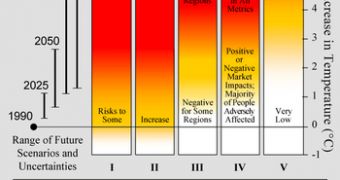According to the latest report issued by the United Nations World Meteorological Organization (WMO), there is no place to run and hide from the increasing greenhouse gas emissions that reach a new alarming level.
While comparing the numbers provided for 2010 with those displayed in 1980, we are witnessing a growth of CO2 emissions that are now reaching 389.0 ppm.
“The latest analysis of observations from the WMO Global Atmosphere Watch (GAW) Programme shows that the globally averaged mixing ratios of carbon dioxide (CO2 ),methane (CH4 ) and nitrous oxide (N2O) reached new highs in 2010, with CO2 at 389.0 ppm, [2] CH4 at 1808 ppb and N2O at 323.2 ppb. These values are greater than those in pre-industrial times (before 1750) by 39%, 158% and 20%,respectively,” reports WMO.
All in all, CO2 isn't the only thing we have to worry about. Researchers say that CH4 expanded its influence to 1808 ppb as the N2O concentration grew up 323.2 ppb by 2010.
According to experts from WMO, carbon dioxide, methane and nitrous oxide are the main elements representing greenhouse emissions that put the air quality and the wellbeing of the entire population in great danger.
While trying to spot the main threats in this equation, WMO experts say that the growth of CO2 and N2O from the atmosphere can be partially explained through the use of nitrogen-based fertilizers (including manure), which have harmed the overall nitrogen cycle a great deal.
Nations all across the globe can reduce the N2O emissions by relying less on fertilizers applied to agricultural fields.
At this point in time, these alarming numbers will be tackled during the global climate change conference taking place in Africa, Durban, within 5 days.
Representatives from governments all across the globe will join forces to reestablish the fragile atmospheric balance, since scientists warn that lack of proper regulations might lead to a record concentration of GHG, far higher than what is currently threating us.
Several eco-groups are already aware of this threat's enormous potential and are working on raising the people's level of awareness regarding global warming and greenhouse gas emissions and hope that a future legal framework will provide better results.
“Climate change threatens to have catastrophic impacts, and as the Kyoto Protocol first commitment period expires in 2012, the time for empty rhetoric has run out. Now is the time for action," according to Melita Steele, climate campaigner for Greenpeace Africa.

 14 DAY TRIAL //
14 DAY TRIAL //